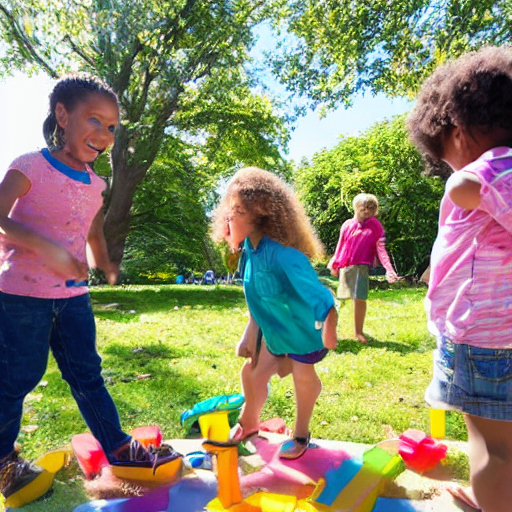Introduction
Fostering positive social interactions among children is a crucial component of their development. Positive social interactions not only enhance their communication skills but also build their confidence and empathy. Parents, educators, and caregivers have the fundamental responsibility to guide and support children in developing healthy and constructive social skills. Engaging in shared activities, creating a supportive environment, and leading by example are paramount in encouraging children to form meaningful connections with their peers.
The Significance of Social Interactions
Social interactions are vital for the holistic development of children. Engaging with others helps children learn about cooperation, patience, and understanding different perspectives. This interaction is essential not only for their immediate peer group but also in preparing them for future societal interactions. Positive social engagement encourages friendship bonds, nurtures emotional intelligence, and bolsters overall well-being.
Creating a Conducive Environment
Safe and Respectful Spaces
To encourage positive interactions, it is essential to provide a safe and respectful environment. Such spaces can help children feel secure and open in their expressions. Schools, homes, and community centers should promote inclusivity, fairness, and respect in all interactions among children.

Modeling Positive Interactions
Children learn a great deal by observing the adults around them. By displaying positive social behavior, such as active listening, empathy, and respect, adults can model how to interact constructively. Children often imitate these behaviors and incorporate them into their own social interactions.
Activities that Promote Social Interaction
Interactive Games and Sports
Games and sports are excellent ways to promote teamwork, collaboration, and leadership skills. Activities like team sports, board games, or group challenges encourage children to work together and communicate effectively. These recreational activities can teach important life skills such as winning and losing gracefully, strategic thinking, and the importance of fair play.
Storytelling and Role-Playing
Storytelling and role-playing provide platforms for children to express themselves creatively and understand different viewpoints. By engaging in storytelling sessions or taking on roles in imaginary play, children develop empathy and the ability to navigate complex social situations. Encouraging them to create stories and act them out can help them in recognizing and valuing diverse perspectives.
Encouraging Empathy and Kindness
Empathy and kindness serve as the foundation for positive social interactions. By understanding other people’s feelings, children are better equipped to respond appropriately and build meaningful relationships.
Teach Empathy Explicitly
Teaching children to recognize and respect others’ emotions can be achieved through explicit instruction and discussion. Books, media, and discussions that explore different emotions and scenarios can serve as educational tools for this purpose. Role-playing scenarios in which children consider how others might feel can also be valuable.
Practice Acts of Kindness
Creating opportunities for children to engage in kind acts can reinforce the importance of positive social behavior. Activities such as helping peers, participating in community service, or engaging in simple acts of kindness, like sharing or complimenting, can foster a culture of compassion and understanding.
Nurturing Inclusivity and Diversity
Fostering an understanding and appreciation of diversity is crucial for positive social interactions. Children need to be exposed to different cultures, ideas, and backgrounds to understand the wider world.
Inclusive Activities and Celebrations
Organizing inclusive activities and celebrations that honor various cultures and traditions can help children appreciate diversity. These events encourage children to learn about and respect differences in race, culture, language, and beliefs.
Encourage Friendships Across Diverse Backgrounds
Facilitating friendships among children from different backgrounds is crucial. Helping them find common interests and allowing them to discover shared experiences can foster mutual respect and understanding. Parents and educators can introduce children to diverse books, games, and activities to broaden their horizons.
Addressing Challenges and Conflict Resolution
Teaching children how to handle disagreements and conflicts constructively is essential for sustaining positive interactions.
Conflict Resolution Skills
Providing children with the skills to resolve conflicts peacefully encourages responsibility and maturity. They should be taught to express their feelings calmly, listen to others, and work together to find common ground. Role-playing conflict scenarios and discussing possible solutions can be practical teaching tools.
Encouraging Dialogue
Teaching children to engage in open, respectful dialogue can prevent misunderstandings and conflicts. Encouraging children to share their thoughts and feelings and consider other viewpoints allows for healthy communication.
Conclusion
Encouraging positive social interactions among children is an ongoing effort that requires patience and commitment from everyone involved in their development. By providing safe environments, modeling appropriate behaviors, engaging in interactive activities, teaching empathy, and nurturing inclusivity, we can guide children toward building meaningful and healthy relationships. These efforts not only influence their current social landscape but also prepare them to be compassionate, understanding adults who contribute positively to society.